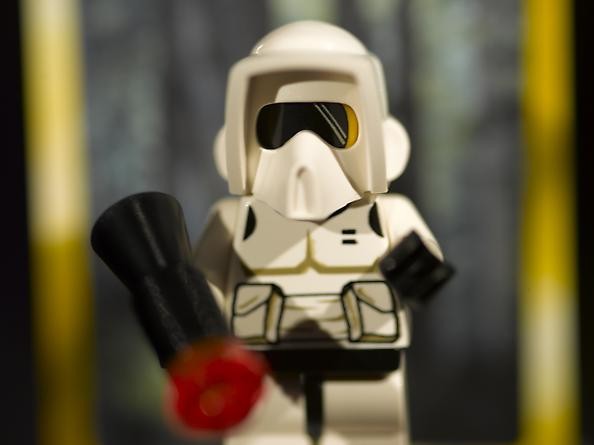David Levinthal
06 Jun - 12 Sep 2012

© David Levinthal
Untitled (from the series Star Wars), 2010
Pigment print on Hahnemuhle paper
17 x 22 in
Untitled (from the series Star Wars), 2010
Pigment print on Hahnemuhle paper
17 x 22 in
DAVID LEVINTHAL
Star Wars
6 June - 12 Septembr 2012
The Galería Javier López is proud to present an exhibit of new work by the American photographer David Levinthal (b. San Francisco, 1949), his second solo show in Madrid. In 2008, we showed a selection from some of his best-known series—Space (1988, 2007), Wild West (1987–1989), and Desire (1990–1991)—and this current exhibition features his most recent work, which is drawn from the universe of the science-fiction film epic Star Wars.
Levinthal is a studio photographer, who creates special scenes peopled by dolls and toys to reflect an archetypal American iconography. His imagery is based in pop culture: comics, television series, advertising, pin-up magazines. The figures in his compositions seem at first to hark back to childhood, but a second look shows them participating in an adult world dominated by technology and violence. He says himself "that toys are not benign objects, but metaphors for culture itself", which make us question the very nature of reality.
In this series, the characters and spacecraft are recognizable as Lego’s tiny plastic versions of the action heroes from George Lucas’s films, films that have become modern myth since Star Wars first entered the collective consciousness in 1977. The contrast between the figures and the monochrome backgrounds helps to banish any sense of scale, and the strong lighting makes the intergalactic machines and the weapons carried by the dramatis personae more menacing. His use of shallow depth of field and softer focus around an enlarged close-up shot to animate the objects in the foreground is characteristic: “I began to realize that by carefully selecting the depth of field and making it narrow, I could create a sense of movement and reality that was in fact not there”. Yet the Lego aesthetic is still definitely present, so that the audience is conscious of the representations’ multi-level artificiality.
Instead of the polaroids that won him international renown, the technique Levinthal uses for these photographs is that of pigment print on photographic paper. Since 2007, he has been using a Hasselbad H1 that allows him to view the images while he is working on them, tweaking them immediately, and then later processing the digital images and making proofs in the studio. This gives a form of total on-site control that, in certain respects, ends up creating a process quite close to the Polaroid method.
David Levinthal studied for an MFA in photography at Yale University and later for a postgraduate degree at the Massachusetts Institute of Technology (MIT). Public collections featuring his works include the Metropolitan Museum of Art, the Brooklyn Museum of Art, the Whitney Museum of American Art, and MoMA in New York; the Art Institute of Chicago; LACMA in Los Angeles; the Museum of Fine Arts in Houston; the Centre Georges Pompidou in Paris and the Eurostar Collection in Graz.
Star Wars
6 June - 12 Septembr 2012
The Galería Javier López is proud to present an exhibit of new work by the American photographer David Levinthal (b. San Francisco, 1949), his second solo show in Madrid. In 2008, we showed a selection from some of his best-known series—Space (1988, 2007), Wild West (1987–1989), and Desire (1990–1991)—and this current exhibition features his most recent work, which is drawn from the universe of the science-fiction film epic Star Wars.
Levinthal is a studio photographer, who creates special scenes peopled by dolls and toys to reflect an archetypal American iconography. His imagery is based in pop culture: comics, television series, advertising, pin-up magazines. The figures in his compositions seem at first to hark back to childhood, but a second look shows them participating in an adult world dominated by technology and violence. He says himself "that toys are not benign objects, but metaphors for culture itself", which make us question the very nature of reality.
In this series, the characters and spacecraft are recognizable as Lego’s tiny plastic versions of the action heroes from George Lucas’s films, films that have become modern myth since Star Wars first entered the collective consciousness in 1977. The contrast between the figures and the monochrome backgrounds helps to banish any sense of scale, and the strong lighting makes the intergalactic machines and the weapons carried by the dramatis personae more menacing. His use of shallow depth of field and softer focus around an enlarged close-up shot to animate the objects in the foreground is characteristic: “I began to realize that by carefully selecting the depth of field and making it narrow, I could create a sense of movement and reality that was in fact not there”. Yet the Lego aesthetic is still definitely present, so that the audience is conscious of the representations’ multi-level artificiality.
Instead of the polaroids that won him international renown, the technique Levinthal uses for these photographs is that of pigment print on photographic paper. Since 2007, he has been using a Hasselbad H1 that allows him to view the images while he is working on them, tweaking them immediately, and then later processing the digital images and making proofs in the studio. This gives a form of total on-site control that, in certain respects, ends up creating a process quite close to the Polaroid method.
David Levinthal studied for an MFA in photography at Yale University and later for a postgraduate degree at the Massachusetts Institute of Technology (MIT). Public collections featuring his works include the Metropolitan Museum of Art, the Brooklyn Museum of Art, the Whitney Museum of American Art, and MoMA in New York; the Art Institute of Chicago; LACMA in Los Angeles; the Museum of Fine Arts in Houston; the Centre Georges Pompidou in Paris and the Eurostar Collection in Graz.
